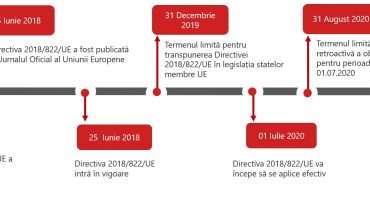Article also available in / Articol disponibil și în limba: ![]() Română (Romanian)
Română (Romanian)
Agricultural industry – cases of transfer pricing for which there are final judgments issued by Romanian courts
article published on 27 February 2019
Despite the fact that the contribution of the agricultural industry to Romania’s Gross Domestic Product is in constant decrease as a result of the structural changes in the way the economy operates, it is still represented by a significant number of companies.
Therefore, it is natural in this industry to see a greater number of cases in which are instituted court actions against tax audit reports issued by the tax authority.
Many of the reasonings and arguments admitted by the courts can be used by taxpayers to become aware of what is happening in their industry as support for building a better defense in documenting transfer pricing or to correct certain issues in intra-group transactions.
Finally, if this proactive approach is pursued, taxpayers can avoid any kind of subsequent disputes with tax authorities or any loss in court actions.
Thereby, in the following is presented a summary of the main issues on which the courts have given definitive and irrevocable solutions.
The High Court of Cassation and Justice upheld the recours made by the taxpayer against the solution previously issued by the Galati Court of Appeal in favor of the General Directorate of Public Finances of Braila
(i) if for the transactions consisting in the provision of management services, the documents provided by the legislation are annexed to the transfer pricing file in order to prove the actual performance of the services (consulting agreement, additional acts to the contract, work situations, acknowledgment of receipt, labor reports, tax invoices), tax auditors do not have a legal base to treat management services as non-deductible;
(ii) even so the taxpayer cannot present the employment contracts of the affiliated party employees who provide the management services or cannot present evidence of their transportation and accommodation, it cannot be claimed that these operations did not take place;
(iii) the affiliation between two entities cannot be a prerequisite for assuming that the management service invoices are unrealistic;
(iv) when applying the comparable uncontrolled price method for the transactions of sale and purchase of wheat and maize, attention must be paid in particular to the moment at which the transactions are carried out, the comparison of transactions carried out at different moments may lead to invalidation of analysis;
(v) in case of the application of the comparable uncontrolled price method, the prices charged by other leaseholders over the same period and in the same area prevail over the statistical average prices;
(vi) in case of the application of the comparable uncontrolled price method, it cannot be made a comparison of the normal prices of the goods with a post-factum average price.
The High Court of Cassation and Justice upheld the recours filed by the General Directorate of Public Finances of Braila against the solution previously issued by the Galati Appeal Court in favor of the taxpayer
(i) if the taxpayer requests the court the suspension of forced execution, but the court understands to resolve a request for annulment of a tax administrative act that orders forced execution, this lead to the annulment of the sentence and reconsideration of the case;
(ii) if the reports of tax expertise are not communicated to both the defendant and the applicant, it proves a breach by the first court of procedural rules and principles which cannot be covered by a solution by the court of recourse and which ultimately leads to reconsideration the case by the first court;
The Bucharest Court of Appeal dismissed the recours filed by the General Directorate of Public Finances of Ploiesti against the previous solution issued by the Ialomita Court in favor of the taxpayer
(i) in cases where internal comparables are available, even if the comparable uncontrolled price method cannot be applied, the application of the cost-plus method or the resale price method will prevail to the net margin method;
(ii) the analysis method of all years of the analyzed period must be consistent – the inconsistency between the year-to-year analysis method may lead to invalidation of the analysis;
(iii) if adjustments on transfer prices are required in the adjustment / estimation procedure applied by the tax authority, then these adjustments will be made considering the arithmetic average of three comparable, otherwise there is a risk that they will be in breach of the procedural rules.
The Bucharest Court of Appeal dismissed the recours filed by the County Public Finance Administration Ialomita against the previous solution issued by the Ialomita Court in favour of the taxpayer
(i) if the tax authorities make adjustments on transfer prices based on generic legislative texts and without explaining in detail how the adjustments were performed and the legal basis for each adjustment, this may lead to the invalidation of the conclusions of the tax audit team
(ii) prices comparisons must consider all the components of a price (acquisition cost, transportation costs, other costs), otherwise there is a risk that the analysis will be invalidated in court (e.g. there must be compared the prices of products delivered to the same location);
(iii) the comparison of prices applied between related parties with prices applied in relation to independent parties must consider volumes sold to both affiliated parties and independent parties, otherwise the analysis may be declared irrelevant.
The Galati Court of Appeal upheld the recours filedt by the taxpayer against the previous solution issued by the Vrancea Court in favor of General Public Finance Directorate of Vrancea
(i) for loans contracted from a related party for the purchase of agricultural machinery and subsequently converted into capital, interest is deductible up to the moment of conversion even if there is no conversion clause in the loan agreement;
(ii) the conversion into equity of loans received from the parent company is not conditional on the existence of such clause in the original loan agreement;
(iii) it is acceptable to compare prices in intra-group transactions with prices from offers received from third parties for services similar to management services received by the taxpayer from affiliated parties;
(iv) the first court should state the reasons why it ignores a judicial expertise that is clearly, thoroughly and documented in all its objectives, otherwise there are chances that the taxpayer’s recourse will be accepted.
The Craiova Court of Appeal rejected the recours filed by the taxpayer against the solution previously issued by the Dolj Tribunal in favor of the General Public Finance Directorate of Craiova
(i) submission of a transfer pricing file that does not comply with the legislative provisions, entitles the tax auditors to make an analysis of their own;
(ii) making comparisons with companies with lower assets and / or revenues related to sorghum and wheat production may lead to the rejection of the comparability study by both tax authorities and the court.
The Bucharest Court of Appeal dismissed the recours filed by the General Directorate of Public Finances Bucharest against the solution previously issued by Bucharest Tribunal – Administrative and Tax Appeals Division in favor of the taxpayer
(i)when the tax authority carries out transfer pricing adjustments ignoring the information presented in the transfer pricing file by the taxpayer and without giving valid arguments based on which they have to choose a method other than the method used by the taxpayer to demonstrate compliance with the arm’s length principle, there is a risk that the courts will invalidate any analyzes and acts issued by the tax authority;
(ii) local legislation does not specifically mention which profitability indicators should be used in applying transfer pricing methods on the every type of activity, which is why the taxpayer can choose the indicator he sees appropriate; however, they must demonstrate that the option is economically substantiated and also they must consider the indicators presented in the OECD Guidelines (e.g. return on assets, return on sales and cost-effectiveness);
(iii) profitability indicators are calculated at the operating level without considering the financial result, especially if the benchmarking study is carried-out at the European Union level (EU companies do not take the risk of foreign exchange and hence a comparison which consider the financial result would not be fair);
(iv) foreign exchange differences do not affect the purchase price and may not facilitate the transfer of profits, they are triggered by events that are not related to the commercial relationship between affiliated parties;
(v) there is no legal restriction either in Romanian or EU legislation on how to compare the results of the tested company with the interquartile range, and therefore there is no legal restriction to use the data for several years;
(vi) the argument of tax authority not to use the database used by the taxpayer and from which it may request access, on the grounds that he “used the data base at his disposal at that time” other than the database used by the taxpayer, is excessive and arbitrary;
(vii) the use by the audit team of a subsequent version of the database accessed by the taxpayer is unacceptable given that the databases are periodically updated, and it is possible that the benchmarking study carried out by the tax authority to include information to which the taxpayer could not have access when he prepared the transfer pricing file;
(viii) if the tax authorities do not mention that the analyzes included in the transfer pricing file are incomplete or incorrect, it can be assumed the tax audit team has tacitly accepted it.
Conclusions
In conclusion, as it can be seen from the analysis of definitive and irrevocable judgments in the agricultural industry, transfer pricing science can lead in many cases to interpretations, and the treatment of the OECD Guidelines as local transfer pricing legislation contributes even more to the increasing complexity of the defense process.
Also, we can see that in most cases in the agricultural industry, taxpayers who choose to go to court to appeal the tax authorities analysis usually gain.
For specific jurisprudence on the industry you represent, please do not hesitate to contact us to request an offer.
Also, if you encounter any of the issues illustrated in this article and you need assistance in building a decisive defense in court, please do not hesitate to contact us.















